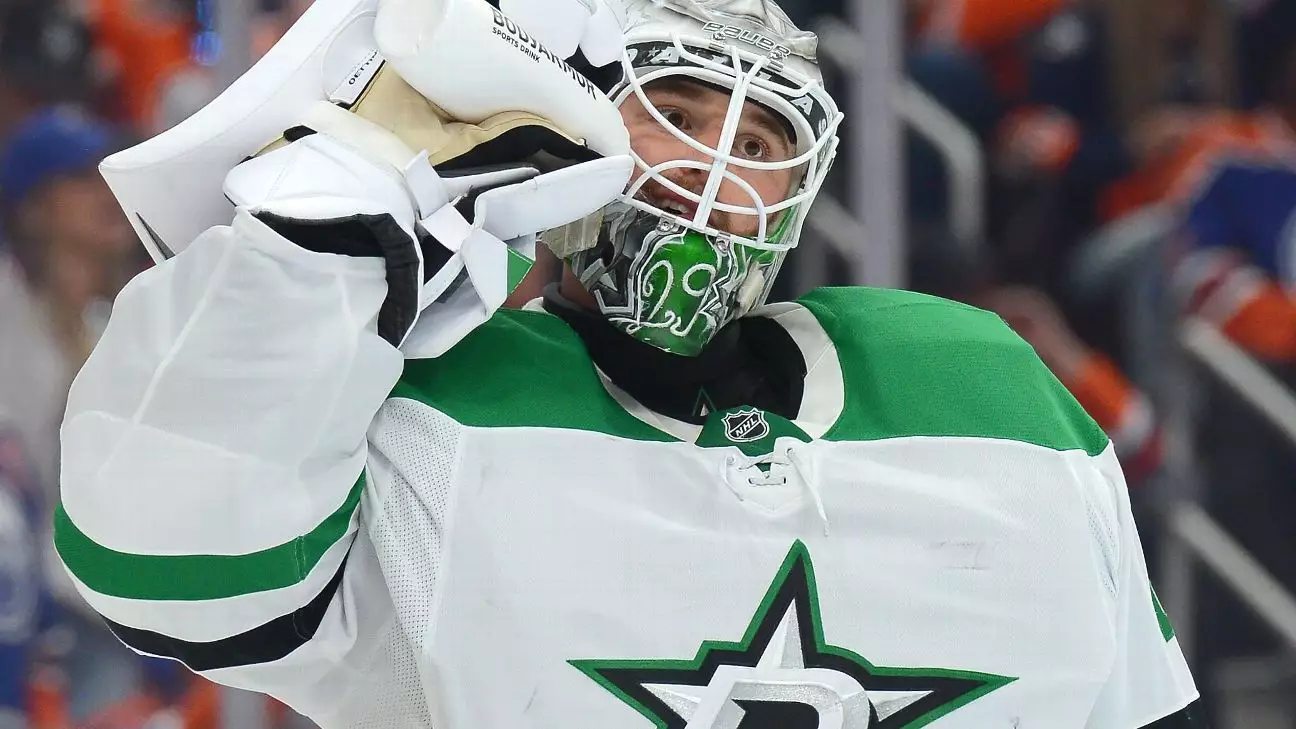The recent ousting of the Dallas Stars from the Stanley Cup Playoffs serves as a poignant reminder of how quickly fortunes can change in professional sports. Goaltender Jake Oettinger, who has consistently been a beacon of hope for the Stars, found himself in an unfathomable predicament during Game 5 of the Western Conference finals against the Edmonton Oilers. Surprised and embarrassed after being pulled from the game following just two minutes, Oettinger’s reaction encapsulated the agony and intensity that come with being so close yet so far from glory. Such moments not only challenge athletes physically but also test their mental fortitude.
Head coach Peter DeBoer, too, faced scrutiny after making the decision to replace Oettinger with Casey DeSmith so early in the match. “It’s about survival,” DeBoer stated, emphasizing the urgency of the situation. His philosophy is rooted in the instinct to stop bleeding when a team is faltering, ultimately wanting to salvage a game that could have shifted the tide for the Stars. However, the repercussions of these decisions resonate longer than the game itself, leaving players like Oettinger to reflect on their performance and the perceived loss of trust from their coach.
Oettinger’s Journey Through Trials
At just 26, Oettinger’s playoff experience contrasts starkly with his youthful age, having participated in four consecutive postseason campaigns. His journey has been marked by ups and downs, including a stunning 64-save performance in a previous playoff series. Questions loomed like ominous clouds regarding fatigue and the burdens of expectation as he battled through 503 shots aimed his way in 18 games this postseason—a staggering number that dwarfs those faced by his counterparts.
Despite these challenges, Oettinger remains steadfast in his belief that he is among the elite goaltenders in the league when he is firing on all cylinders. It is a powerful mindset, almost a mantra, that fortifies him against discouragement and self-doubt. “My job is to stop the puck,” he said, echoing the simplicity of his role amid the complexities of team dynamics and public opinion. This self-awareness is crucial; rather than wallowing in disappointment, he chooses to channel his frustration into potential growth, both personally and professionally.
The Human Element of Athletics
The relationship between a goalie and their coach is inherently symbiotic. A player’s performance impacts a coach’s decisions and vice versa. Oettinger’s insights into his experience indicate that he values these dynamics and stands ready to learn from them. While there was initial concern about the potential strain on their relationship following the game, Oettinger chose to take a constructive stance, asserting that these challenges would ultimately mold him into a better player. This attitude of resilience transforms adversities into opportunities for personal development.
From the coaching perspective, DeBoer’s decision-making under enormous pressure raises critical questions about leadership in high-stakes situations. The choice to substitute Oettinger was fueled by an understanding of player management, as DeBoer weighed Oettinger’s recent performance alongside his physical condition and emotional readiness. Admittedly, the coach had contemplated giving Oettinger a break earlier in the series, highlighting the delicate balance between instilling confidence in a star player and recognizing when to intervene for the greater good of the team.
The Weight of Expectations
As the Stars regroup in the aftermath of their playoff exit for the third consecutive year, the inevitable discussions surrounding their next steps will begin. The specter of lost opportunities looms large. Oettinger’s reflective comments about the “mental grind” of such a long season resonate deeply in the minds of athletes everywhere, underscoring the often-overlooked psychological toll of professional sports. The expectation to perform consistently—to be flawless, even—can often overshadow the reality that athletes are human, subject to the same vulnerabilities as anyone else.
However, if there is one takeaway from this chapter of Oettinger’s burgeoning career, it is the unwavering belief in the power of resilience. This young goaltender has faced both tremendous highs and rocky lows, yet he emerges steadfast, prepared to face the next season with renewed tenacity. The narrative is not merely about wins and losses; it is about athletes learning from their experiences and evolving—both in skill and mindset. In navigating both personal and professional trials, Oettinger embodies the essence of perseverance. Whether on the ice or in life, he illustrates that challenges are often the most significant catalysts for growth.

